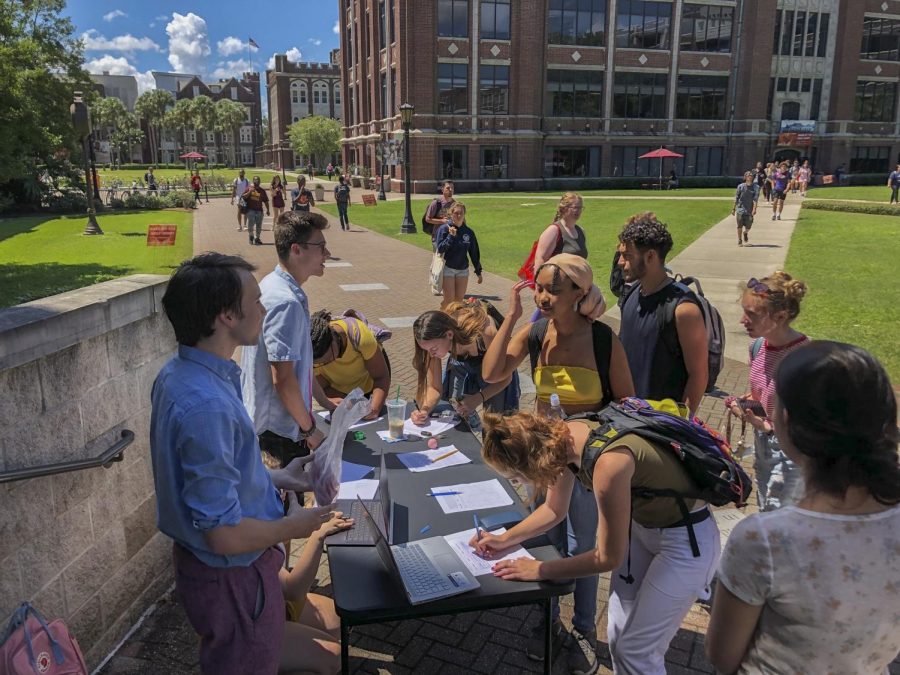Opinion: The fight for condoms still matters
Students sign the condom petition Sept. 3. Britton Hansen, along with the rest of Loyola for Reproductive Rights, created this petition to allow the distribution of condoms on campus.
September 29, 2019
By Britton Hansen
If you’ve been on campus at any point in the last six months, chances are you’ve heard Dylan Ritter and I yell out to you, asking if you’d be interested in signing a petition urging our administration to allow the distribution of condoms on campus. 1,152 of you have signed since we started collecting signatures — well over 1 in 3 of you, nearly 50%.
We’ve garnered a substantial amount of attention, from articles in The Maroon to meeting requests with several administrators. We’ve mobilized a passionate group of students to form an unchartered group dedicated to creating a sexually mindful, healthy environment on our campus. We’ve participated in collaborative phone calls with other coalitions on various Catholic campuses around the country, including Georgetown, Fordham, Creighton and Loyola Chicago, all of whom are fighting the same battle for condom access that we are.
I have been approached by students who have tried to discourage us. They explain to me why condoms on our campus will never be embraced by the administration. They utilize excuses involving the Archdiocese, our financial probation status, and the age-old and never-ending quote, “You chose to go to a Catholic school, so why are you complaining at all?”
I’d like to clear up any confusion about our motivations and goals once and for all.
We started this petition with the knowledge that this was only the first step in a years long battle. Georgetown has had their underground “H*yas for Choice” group since the 1990s, and have since built a robust, self-sustaining organization that provides free access to condoms, pregnancy tests, and Plan B — all without administrative endorsement, and all outside of the given limits of the Catholic Church. Fordham’s “SAGES” group has successfully launched a volunteer-run hotline that provides access to sexual health products and sexual education. Students at Loyola Chicago distribute condoms just outside of university geography, where large masses of students still pass through to get to classes, so as to avoid administrative backlash and jurisdiction.
This is a fight being had on Jesuit campuses around the country — we are no different, and why should we be?
I can sit here all day and explain how I think that the twelve Jesuit values our campus espouses actually are reflected in the passion that my colleagues have shown in the last month, as we canvass dorms to ask for your support, advocate for free and accessible STI testing for students, and work towards stapling thousands of sexual education zines to distribute on campus. Cura personalis comes to mind as I type: caring for the whole person. To care for the entire person— soul, mind, and body — is to provide access to sexual health products that will facilitate a healthy sexual environment. If Loyola is going to practice cura personalis they must allow us the freedom to make healthy and educated choices, the freedom to access condoms without having to be transported off campus, the freedom to take ownership of our health and get an STI test without having to shell out $230 at the student health center.
And let’s not pretend that this is not a debate within the broader Catholic community as well. Pope Benedict XVI lifted the Catholic ban on condom use in 2010, as condoms are one of the only effective methods of preventing the spread of HIV and AIDS, and to quote him, can therefore is a “lesser evil” in such circumstances, as reported by the BBC and New York Times, to the outrage of many others.
We’ve heard from countless students who have told us about their experiences with STIs in the freshman dorms. I fail to see how these issues are inherently different from each other. Is there not a general consensus, backed up by science and statistical studies, that condoms prevent not just the spread of HIV, but also nearly all other STIs? Wouldn’t lifting the ban on condoms, a ban which Jesuit schools are pushed to enforce by the Catholic Church, mend our own school’s STI outbreaks in a meaningful, tangible way?
The student body is not beholden to our administration, to the Archdiocese, or to the Catholic Church.We are beholden to each other. I am beholden to you, to each of the 1,152 students that signed our petition and expressed passion and excitement for our efforts. And as I am beholden to you, our administration is beholden to us, the ones who pay $40,000 a year to be here. Allowing condoms to be accessible on campus may seem like a small issue to tackle, so small that you may not even see the point, but I assure you, it is the first step in a bigger fight — a fight to end abstinence-only sexual education in our public schools, a fight to allow women bodily autonomy, a fight to move the Catholic Church out of its old ways and into a future, our future, where sexual rights are guaranteed for all.
We truly wield all the power, so please don’t let it go to waste. I know I won’t.







